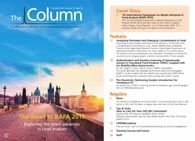Blueberry Extracts in Dental Health
Extracts of wild blueberries (Vaccinium angustifolium Ait.) contain bioactive molecules that could be used in the development of new therapeutic treatments for the dental disease periodontitis.
Extracts of wild blueberries (Vaccinium angustifolium Ait.) contain bioactive molecules that could be used in the development of new therapeutic treatments for the dental disease periodontitis, according to research published in the Journal of Agricultural and Food Chemistry.1 Researchers from the Univeristé Laval in Quebec, Canada, found that extracts of wild blueberries inhibited the activity of the bacterium Fusobacterium nucleatum and also reduced the inflammatory response of the immune system that is associated with symptoms of the disease.
Periodontitis is a disease caused by inflammation of the gums, in response to bacterial infection that damages the soft tissue and bone surrounding teeth. It causes shrinking of the gums and loosening of the teeth; if left untreated can result in tooth loss. The bacterium Fusobacterium nucleatum is associated with the disease and so is a potential target for new therapeutics. Corresponding author Daniel Grenier from the Univerité Laval told The Column that up to 35% of adults in North America are affected by periodontitis. He said: “Given emerging data indicating that there is a relationship between periodontal diseases and systemic health problems such as diabetes, cardiovascular diseases, and preterm birth, studies on preventive and therapeutic strategies targeting periodontal diseases are highly relevant.”
An extract of wild blueberries (with the sugar removed) was characterized by high performance liquid chromatography–mass spectrometry (HPLC–MS) to determine phenolic and flavonoid composition. The paper reported that the extract was composed of 16.6% phenolic acids, 12.9% flavonoids, and 2.7% procyanidins. The same extract was then used in assays to assess the effect on the growth of the bacterium and the authors found that the extract reduced the ability of the bacterium to form a biofilm, thus reducing its defence. Commenting on the study findings, Grenier said: “Moreover, the blueberry extract attenuated the inflammatory response of human macrophages challenged with F. nucleatum, resulting in a decreased secretion of inflammatory cytokines (IL-1β, IL-6, TNF-α) and tissue destructive enzymes (MMP-8, MMP-9). Evidence was brought that this property is likely related to the ability of the blueberry polyphenols to block the activation of the NF-κB signalling pathway that play a key role in inflammatory reactions.”
Work is now ongoing to isolate and characterize bioactive molecules in the extract. Grenier said: “These molecules could then be used for localized application into diseased periodontal sites, through irrigation or insertion of a slowârelease drug device.” - B.D.
Reference
- A.B. Lagha, S. DudonÅe, Y. Desjardins, and D. Grenier, Journal of Agricultural and Food Chemistry63, 6999−7008 (2015).

Measuring Vitamin K1 Concentrations in Dogs with Chronic Enteropathy Using LC–MS/MS
May 14th 2025A joint study between the University of Tennessee (Knoxville, Tennessee) and the University of Pennsylvania School of Veterinary Medicine (Philadelphia, Pennsylvania) compared directly measured vitamin K1 (vitK1) concentrations in healthy dogs and dogs with chronic enteropathy (CE) using liquid chromatography tandem mass spectrometry (LC–MS/MS); they also investigated whether supplementation of vitK1 in dogs with CE would significantly increase vitK1 concentrations.
HPLC 2025 Preview: Fundamentally Speaking (Part 2)
May 14th 2025Michael Lämmerhofer from the Institute of Pharmaceutical Sciences, University of Tübingen, Germany, spoke to JFK Huber Lecture Award winner of 2024 Torgny Fornstedt, professor in analytical chemistry and leader of the Fundamental Separation Science Group, Karlstad University, Sweden, about his pioneering work in high performance liquid chromatography (HPLC) with a focus on fundamentals, ion-pair chromatography, and oligonucleotide applications.

.png&w=3840&q=75)

.png&w=3840&q=75)



.png&w=3840&q=75)



.png&w=3840&q=75)










